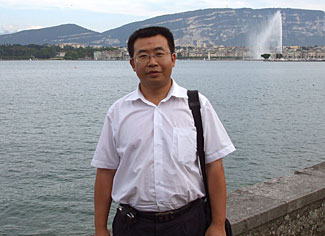 I was saddened this morning to read (via China Rights Lawyers Concern Group) about how human rights lawyer Jiang Tianyong was dragged away from his home by four plainclothes Public Security Bureau officers in front of his crying daughter yesterday. Jiang was here in Washington last week, courageously testifying in front of Congress on human rights violations associated with China’s One Child Policy and his experience defending blind rights advocate Chen Guangcheng. Other rights lawyers, including Li Fangping and Li Heping, have been either detained or put under heavy surveillance (ruanjin) for the duration of President Obama’s visit to China.
I was saddened this morning to read (via China Rights Lawyers Concern Group) about how human rights lawyer Jiang Tianyong was dragged away from his home by four plainclothes Public Security Bureau officers in front of his crying daughter yesterday. Jiang was here in Washington last week, courageously testifying in front of Congress on human rights violations associated with China’s One Child Policy and his experience defending blind rights advocate Chen Guangcheng. Other rights lawyers, including Li Fangping and Li Heping, have been either detained or put under heavy surveillance (ruanjin) for the duration of President Obama’s visit to China.
Rather than celebrating the development of rule of law, the CCP seems intent on systematically harassing and locking up the very individuals who represent the best hope for innovation and civil society development in China. It’s happening outside the legal sector too. Environmental whistleblower Sun Xiaodi and his daughter were jailed earlier this year for reporting a potentially devastating uranium leak from a decommissioned mine. More recently, Zhao Lianhai, parent of one of the babies affected by the tainted milk scandal and organizer of a parents' group called the “Milk Powder Group,” was detained just a few days ago in Beijing. Aside from reporting corruption and seeking increased accountability, what exactly is Sun and Zhao’s crime? The CCP will no doubt argue that they were “endangering state security.” (Read more after the jump)
These actions have implications for the rest of the world. How can we enforce a climate change agreement when those reporting on corruption at the local level are routinely arrested? How can we rely on China as an economic partner when bad news about the economy is censored? President Obama called on Beijing to take up more responsibility as an emerging global leader, which, if you read the subtext, means moving beyond the take-take-take attitude that has come to characterize the CCP’s world view. The Chinese government is under domestic pressure to do the same. A group of Beijing University students recently expressed their desire for China to “step out and take more global responsibilities” (via Think Six). Note the difference between “taking resources” and “taking responsibility.” Part of that responsibility has to be the upholding of basic, universal human rights.